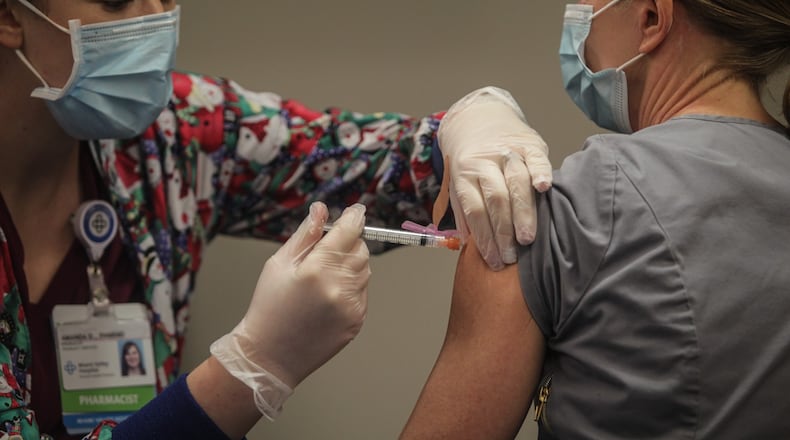“This pathway was created because there is evidence that there is protection that arises from a previous infection, but it is not intended to prevent or dissuade anyone from receiving the vaccine,” said Dr. Roberto Colón, chief medical officer at Miami Valley Hospital.
All three hospital networks have set a Dec. 1 deadline for their employees to receive the COVID-19 vaccine.
To defer vaccination based on natural immunity, Kettering Health staff will be required to provide a positive antibody test every three months proving they still have an immune response to COVID-19. Premier Health Chief Medical Officer Marc Belcastro said at a press conference last week that Premier’s policy is similar to Kettering’s.
Neither the U.S. Centers for Disease Control and Prevention or the Food and Drug Administration recommend using antibody tests to assess immunity to COVID-19 because there is no agreement on the quantity or kinds of antibodies needed to protect someone.
At Dayton Children’s, employees who can provide a positive COVID-19 test result from 2021 will be allowed to defer vaccination for six months from the Dec. 1 deadline. Dr. Michael Klatte, chief of infectious disease at Dayton Children’s Hospital, said such deferrals will be re-evaluated as the medical literature on the duration and extent of protective immunity following infection and vaccination evolve.
These accommodations come at a time when hospitals nationwide are short-staffed and fear worsening shortages if large numbers of employees choose to leave rather than get the vaccine.
The science on natural immunity
The literature is mixed on how much protection infection with COVID-19 provides and for how long. Some recent studies indicate that contracting COVID-19 is as effective as vaccinations at creating an immune response and provides lasting protection from reinfection. Other studies point to vaccinations boosting immunity for those previously infected.
Two preprint studies — which are not yet certified by peer-review and should not be used to guide clinical practice — often cited by believers in the strength of natural immunity point toward coronavirus infections providing lasting and robust immunity. A 700,000-person study from Israel this summer found that people who were previously infected with COVID-19 were 27 times less likely to have a symptomatic reinfection. A June Cleveland Clinic study of health care workers over five months found that none who had previously tested positive for coronavirus were infected again.
An August study from the CDC of hundreds of Kentucky residents found that unvaccinated people had 2.34 times the odds of reinfection compared with the fully vaccinated, suggesting that getting vaccinated provides additional protection to the previously infected.
“While infection creates a broad-based antibody response, vaccination creates a specialized response, to the point that infection plus immunization is known to offer the best antibody protection, better than immunization or infection alone, a type of ‘super-immunity,’” said Dr. Nancy Pook, emergency medical director for Kettering Health. “According to recent studies, natural immunity currently offers 70-80% protection against reinfection. Though immunity does occur after infection, we don’t know how long it lasts. Immunity from vaccination will be more long-term than what would naturally follow after having COVID-19, and according to the CDC, individuals with a prior COVID-19 infection should still be vaccinated.”
No matter the conclusion on natural immunity, health leaders strongly discourage opting for infection over the vaccine. Public health officials and area doctors have repeatedly said COVID-19 — which has killed over 23,000 Ohioans, including over 700 residents under 50 — is dangerous and the vaccines are safe and effective.
“Is natural immunity as good as or better than vaccine-induced immunity? Rather, the million-dollar question is how long does protective immunity against COVID-19 infection last when it is generated?” said Klatte. “People with waning protective immunity from COVID-19 vaccination can get another dose of vaccine if necessary. However, what are unvaccinated people with waning protective immunity from primary COVID-19 infection supposed to do? Purposefully reinfect themselves? The only way to rid this planet of COVID-19 once and for all is to do what we did for smallpox and what we’ve almost achieved against poliovirus - vaccinate this virus into extinction.”
Have questions about COVID-19, face masks, vaccines, testing, quarantining or anything else pandemic-related? Send them to jordan.laird@coxinc.com. Answers will be published regularly in print and online.
About the Author

